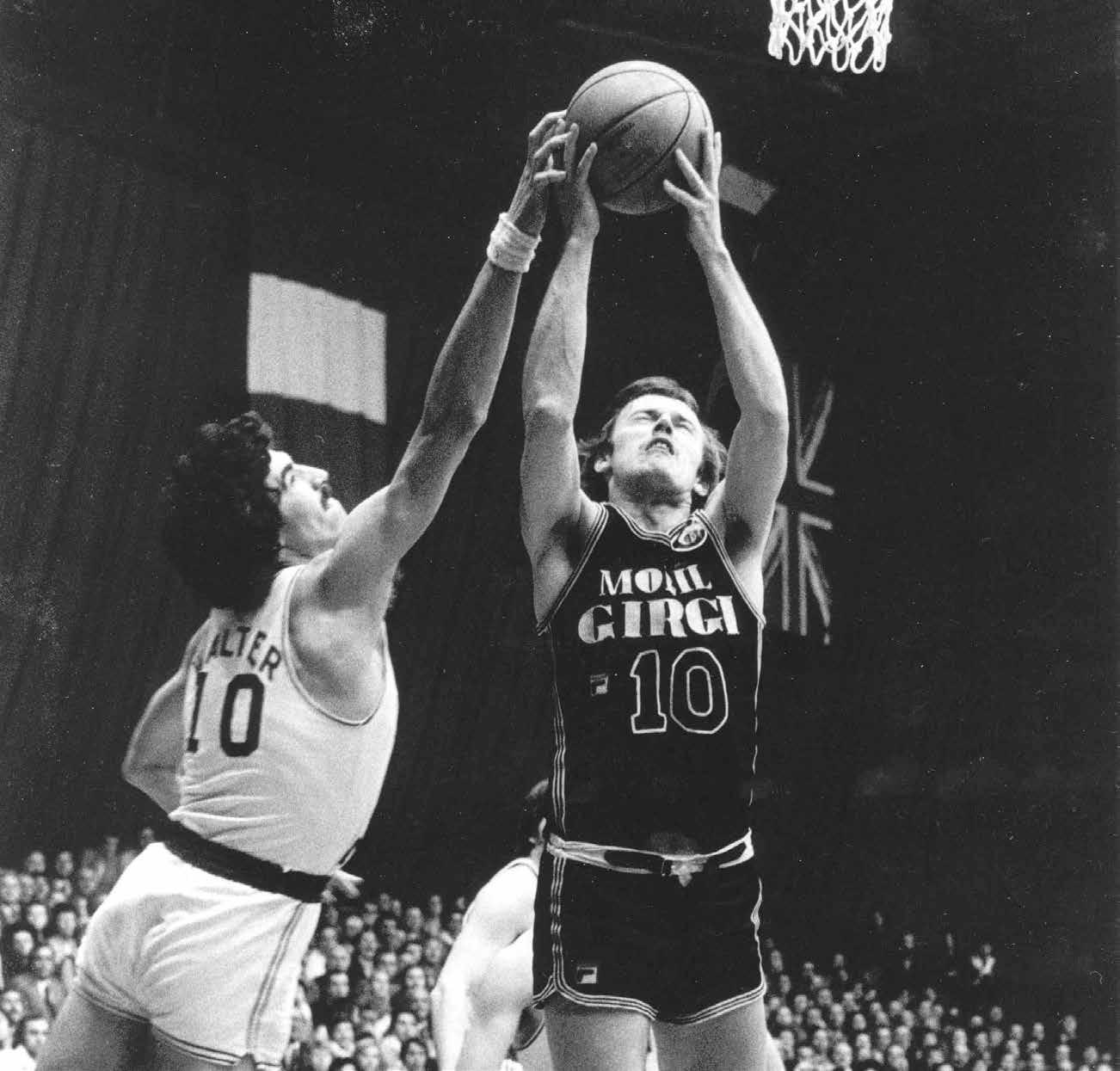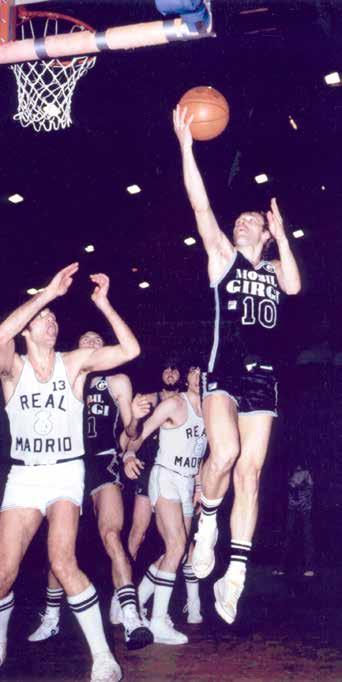
6 minute read
Hard-working star ALDO OSSOLA
Aldo
Ossola
Advertisement
Von Karajan of Italian basketball O n May 4, 1949, Italian sports suffered a great tragedy. A plane crashed on the hill of Superga, near Turin. Among the 31 victims were 18 players from the great football team Torino, the best Italian team at the time and win ner of five league titles and one national cup between 1942 and 1949. There were no survivors, but two great names from that tragedy would be passed on to resurrect Italian sports. One of the crash victims, Valentino Mazzola, was the big star of Torino and the Italian national team, just like his son Sandro Mazzola would become in the 1970s for Inter Milan and the Ital ian national team. Another victim, Franco Ossola, had a little brother, Aldo, who was only 4 years old at the time of the tragedy. Aldo would grow up to triumph in another sport, basketball, while another brother, Lu igi, also chose football and played in the first division with Varese, Roma and Mantova. Aldo Ossola’s case is not typical. He starred at bas ketball without thriving at what is for many the most important part of the game: shooting. Scoring was not his strong point, even though he knew how to surprise his teammates and rivals alike from time to time. His strengths were organizing the game, vision, passing, great defense and leadership. He was a tall guard, at 1.92 meters, which allowed him to be a solid rebound er, too. In Italian, there is a word that defines his role perfectly: “regista”. Ossola was a great guard and a great floor director who earned his nickname – the Von Karajan of Italian basketball – because he could orchestrate a basketball game like the world-famous classical music conductor of that time, Herbert Von Karajan.
Ten finals in a row Ossola was like the director of an orchestra, the great Ignis Varese of the golden era, between 1969 and 1979. The team played an unprecedented 10 consec utive finals in the EuroLeague, winning five and losing five. The secret was great balance between great for eign players like Manuel Raga, Ricky Jones, John Fultz, Bob Morse, Charlie Yelverton and Randy Meister, with great Italians like Ossola himself, Dino Meneghin, Do do Rusconi, Marino Zanatta, Ottorino Flaborea, Ivan Bisson and Giulio Iellini. That’s not to forget their great coaches, Aleksandar Nikolic, Giancarlo Primo and San dro Gamba.
This unbelievable run began on April 9, 1970, in Sarajevo, where Ignis defeated the reigning champ, CSKA Moscow, 79-74. The stats show that Meneghin scored 20 points and Raga 18, but Ossola’s contri bution was much greater than his 4 points. He the brain of his team, a leader, a great guard, a man with the confidence of his coach, the legendary Professor Nikolic. He wore number 10 and he was a 10 as a player. The following year, in Antwerp, CSKA paid back Varese with interest, 67-53. Ossola was stuck at 4 points again. In his third straight final, 1972 in Tel Aviv, Ignis defeated Jugoplastika by the score of 70-69 with 21 points by Meneghin and 20 by Raga and, again, 4 points from Ossola.
In another final against CSKA, 1973 in Liege, Varese won 71-66 behind 25 points by Raga and 6 by Ossola.
101 greats of european basketball Aldo Ossola
But in 1974 in Nantes, where they lost 84-82 to Real Madrid, Ossola was back to his customary 4 points. The next year the final was a rematch in Antwerp, where Varese prevailed, 79-76, of course with 4 points coming from Ossola in 37 minutes on the floor. His fifth and last title came in 1976 in Geneva, again against Real Ma drid, 81-74. But for that one, Ossola set his best scoring mark in a final: 9 points. Morse (28) and Meneghin (23) shined for the champs. Over the next three years, Os sola and Varese would play as many continental finals, but lost to Maccabi, Real Madrid and Bosna Sarajevo, respectively. Ossola’s sixth European trophy came in 1980 in Milan against Gabetti Cantu, 90-88 in overtime, in the Saporta Cup.
“He was a great playmaker, but he had no shot,” Borislav Stankovic, ex-secretary general of FIBA, remembered of Ossola. In 1968, Stankovic became Italian champion with Orasonda Cantu, thus becoming the first foreign coach to win the title. “He lacked a shot but made up for that with game vision, speed, aggres siveness on defense. He was the soul and spirit of that team. He reminded me of Moka Slavnic, but without the shooting.”
Luca Chiabotti, the prestigious former La Gazzetta dello Sport basketball expert, also recalled Ossola’s scoring ability: “In the third game of the Italian League finals of 1978 against Synudine Bologna, with Dan Pe terson on the bench, Ossola, already 33, was always free because the rivals never thought he could shoot. The stats were on their side: in 27 previous games, he had totaled 52 points, less than 2 per game. But in that decisive duel, he scored 11, a huge amount for him and he was a key player to take the title.”
Another thing, almost unthinkable today: during his whole career Ossola worked a day job at a family
business of jewelry and opticians. In 2005, he played again in an official game at the age of 60 with his son Emanuele, who was born in 1970. The Italian federation had to change some rules to allow Ossola play at this age, but his great friend Meneghin, then the president of the federation, said, “For Aldo, we will even change the constitution”. The doctors green-lighted the issue because, thanks to his lifestyle, Ossola was in great health.
A title collector Ossola’s family may have had a jewelry shop, but he had one of his own stuffed with medals and trophies. Aside from the five European crowns and the Saporta Cup title, Ossola won the Italian League seven times, the Italian Cup four times and Interconti nental Cups twice, in 1970 and 1973, for a total of 19 major titles. He has said that he won “everything that can be won.”
While Ossola triumphed in Varese (plus a brief stay at Onesta Milano from 1965 to 1968), he had less luck with the Italian national team. He played the 1969 EuroBasket in Naples with a discreet 1.8 points per game. He only played 25 games with the national team. When Italy started winning titles, Coach Gi ancarlo Primo preferred Pierluigi Marzorati and Giulio Iellini. But despite lacking titles at the international level, Ossola has one of the most complete careers ever of an Italian player together with Dino Meneghin. In fact, Ossola and Meneghin formed a duo that, for many, is still the best guard-center combination ever in Italian basketball.
Of course, when Euroleague Basketball chose in 2008 to identify the 35 best players during the cel ebration of 50 years of European club competitions,
Ossola was among the names. Sandro Gamba, one of his coaches during the great Varese dynasty, defined Ossola in statements he made to Corriere della Sera in 2005: “He always saw the game as something fun. That’s why he never wasted his physical strength. To me, he was the best Italian point guard of all time.”











